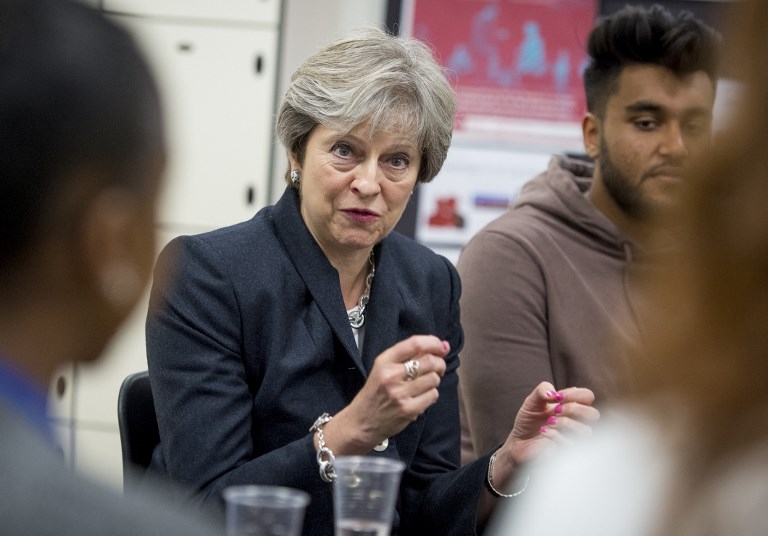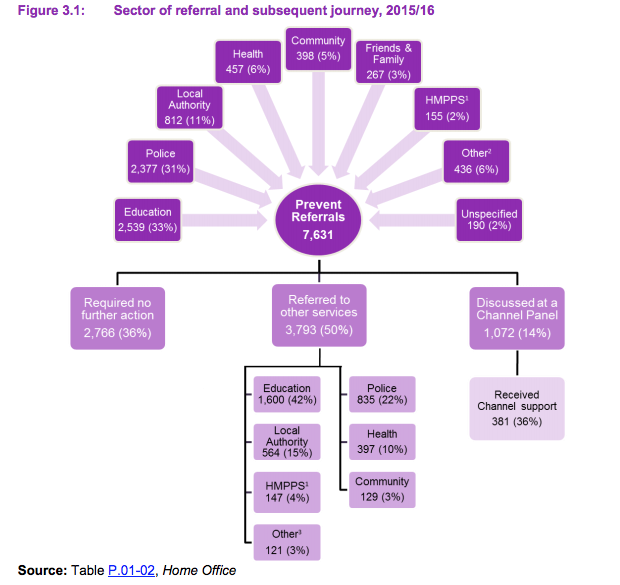Thousands referred to UK Prevent Strategy over 'Islamist extremism' fears

More than 7,500 people were referred to the British government's Prevent programme in 2015-16 over concerns that they were at risk of being drawn into terrorism, with almost two-thirds of referrals relating to alleged Islamist extremism, Home Office data shows.
The statistics published on Thursday revealed referrals over Islamist extremism concerns included 1,504 children under the age of 15.
A further 1,378 people aged between 15 and 20 were also referred for Islamist extremism.
Referrals relating to Islamist extremism concerns totalled 4,997 (65 percent) out of 7,631 cases between April 2015 and March 2016.
Ten percent of referrals (751 people) related to far-right extremism concerns.
In all cases, individuals deemed to be at risk of "radicalisation" were screened by police to check whether they were already part of a terrorism investigation.
Prevent is a strand of the UK government's counter-terrorism strategy concerned with tackling extremism with the aim of “stopping people becoming terrorists or supporting terrorism”.
Muslims make up about four percent of the population of the UK, numbering about 2.8 million people out of a total population of 60 million, according to data collected at the last census in 2011.
Miqdaad Versi, the assistant general secretary of the Muslim Council of Britain, said on Twitter that the statistics showed that you are 41 times more likely to be referred to Prevent if you are a Muslim.
Among all individuals who were assessed, 2,766 people left the process without requiring any further action, while 1,072 cases were deemed serious enough to be referred into the Prevent-linked Channel counter-radicalisation scheme.
But just 264 people, including 82 children under 15, were referred to Channel over Islamist extremism concerns.
Amrit Singh, senior legal officer for national security and counter-terrorism at the Open Society Justice Initiative, who authored a critical report of Prevent last year, told Middle East Eye: “The government’s own data confirms that the Prevent strategy is unjust and dangerously counterproductive. Large numbers of people - mostly Muslim - are being needlessly referred to this inherently stigmatising programme as extremists only to be deemed not to require Channel assistance.
"The large number of children being referred to Prevent is particularly alarming, and indeed, counter to the UK’s obligation to give primary consideration to the best interests of the child. It is time to abandon this dangerous policy."
'Tailored package of support'
Individuals referred into Channel are assessed by a local authority-chaired panel that includes education, health sector and police professionals and then offered a "tailored package of support".
The government describes Channel as a voluntary safeguarding programme, but Simon Cole, the chief constable of Leicestershire Police and the national police lead for Prevent, told a conference earlier this year that individuals who refused to cooperate would attract the interest of counter-terrorism police.
“A Prevent referral is a voluntary referral. It is not a compulsion. If you do not want to comply or cooperate then you do not have to do so,” said Cole. But he added: “If you choose not to of course that does cause us to question why and you may head into the Pursuit space.”
Pursuit is the strand of the UK’s counter-terrorism strategy concerned with stopping attacks by attempting to disrupt the activities of those it suspects of involvement in terrorism-related activities.
The government said that it assessed that of those who had left the Channel process "302 (83 percent) did so with their vulnerability to being drawn into terrorism judged as having been successfully reduced.
A press release issued by the Home Office included a case study of an individual called "Dan", a 47-year-old described as an active member of far-right groups and an avid collector of Nazi memorabilia and literature, and a "heavy drinker".
"The support I have received through this process has allowed me to feel more valued as a person and made me see there is more to life than what I was doing. Without the help of this process, I am sure I would be in prison now,” Dan said, according to the press release.
'Chilling effect'
Prevent was overhauled by the Conservative-led coalition government in which current Prime Minister Theresa May was home secretary in 2011.
But the encroachment of Prevent into schools, universities and hospitals has proved one of the most controversial aspects of the strategy in the UK, with critics suggesting that it has had a “chilling effect” on classroom and academic debate.
"The high number of children being referred under Prevent is concerning, particularly given that the impact on children’s rights was wholly overlooked as the Prevent duty passed through Parliament," Rosalind Comyn, Legal and Policy Officer at Rights Watch (UK) which last year published a report on the impact of Prevent in schools, told MEE.
"The creep of counter terrorism policies into education is deeply worrying: it undermines schools’ function as a nurturing and challenging learning environment and creates a dynamic in which children become distrustful of their teachers and classmates.
"While the release of these statistics is long overdue, it is a welcome first step towards remedying the transparency deficit that has been a hallmark of the development and operation of the United Kingdom’s counter extremism strategy."
In universities, Middle East Eye revealed earlier this year how campus staff were being encouraged to "manage" Palestinian activism and other issues deemed contentious, including opposition to Prevent itself, as part of their Prevent Duty responsibilities.
Human rights groups, parliamentary committees, Muslim community groups and David Anderson, the UK’s former counter-terrorism legislation watchdog, have all called for the strategy to be reviewed, reformed or abolished.
Under the Prevent Duty brought into law in mid-2015, thousands of public sector workers including teachers and doctors have a responsibility to report cases of individuals who they believe may be at risk of being drawn into terrorism-related activities.
Hundreds of thousands of public sector workers have received training to help them identify individuals at risk, but concerns have been raised about the quality of the training packages on offer, many of which are provided by commercial companies.
A third of referrals (2,539) came from the education sector, where the median age of those referred was 14.
Just under another third (2,377) were made by the police, according to the new data. Eleven percent of referrals came from local authorities, six percent came from the health sector and five percent from the community.
Intelligence gathering
Some local councils have also extended Prevent training to cover taxi drivers, heightening concerns that the programme is being used by police to gather data and intelligence.
Home Secretary Amber Rudd, speaking in the aftermath of the attack on a concert hall in Manchester in May in which a suicide bomber killed 22 other people, said that Prevent was used to gather intelligence from community groups.
But Prevent officers in Manchester faced criticism over the attack after it was revealed that Salman Abedi, the British-Libyan bomber, had not been referred into the programme even after concerns had been raised with police by members of the local community.
Rizwaan Sabir, a criminologist specialising in the study of British counter-terrorism and insurgency, told MEE: “What these latest figures show is that despite all its claims for fairness and objectivity, Prevent has been, and remains, a programme framed on an Islamophobic logic that views Muslims as inherently suspect and therefore worthy of surveillance and intervention.
"These latest findings also vindicate what critics of this divisive and Islamophobic policy have now been arguing for almost a decade."
These latest findings vindicate what critics of this divisive and Islamophobic policy have now been arguing for almost a decade
- Rizwaan Sabir, criminologist
Abed Choudary of the Islamic Human Rights Commission campaign group told MEE: "IHRC and many other organisations argued that the Prevent Duty introduced in 2015 would lead to an increase in the number of reports made as well as the criminalisation of the Muslim community. These numbers, unfortunately, show that we were right.
"What these numbers hide is the impact of Prevent on the Muslim community. The fear it has instilled in parents, the way students self-censor in case they are misunderstood, the emotional trauma families go through as a result of a referral. The Impact of Prevent on the Muslim community has been far-reaching and extremely damaging.
Ibrahim Mohamoud, a spokesperson for civil liberties campaign group Cage, said that the statistics showed that Prevent was targeting Muslims, and Muslim children in particular.
"The latest statistics illustrate that Prevent overwhelmingly targets Muslims, especially children, and is creating a suspect community where children are being dragged through disastrous state intervention," Mohamoud told MEE.
"The fact that 2,127 children were referred through Prevent, and 2,019 do not require Channel intervention is deeply troubling. It shows there is an overreporting of children when they are actually innocent."
'Experimental data'
Previous statistics about Prevent has mostly been released as a consequence of freedom of information requests, and the government admitted that the new data was considered "experimental".
"It was acknowledged that there was a need for greater consistency in recording referrals across the regions. Work has been undertaken to improve this," the document noted.
Ben Wallace, the security minister, said: “The government has been determined to bring greater transparency to the programme and I am delighted that by publishing these figures we can help inform the debate around the policy. There is still a way to go to improve the approach and awareness of how to better safeguard our children and vulnerable adults, but the policy is going in the right direction.”
A spokesperson for the Muslim Council of Britain told MEE: "It is welcome that the Home Office appears to have listened to concerns about the lack of transparency with Prevent, and has started to provide greater information.
"We remain deeply concerned at the approach taken especially within education sectors where young people are involved. In particular, we would like to understand whether young children - even at nursery - being referred to Prevent, is really helping to prevent terrorism.
"Notwithstanding this important increase in transparency, the MCB alongside a large number of civil society institutions and academics, retains our call for an independent inquiry into Prevent to holistically and sincerely engage with serious concerns previously raised, and to ensure the strategy to keep our nation safe is truly effective."
Stay informed with MEE's newsletters
Sign up to get the latest alerts, insights and analysis, starting with Turkey Unpacked
Middle East Eye delivers independent and unrivalled coverage and analysis of the Middle East, North Africa and beyond. To learn more about republishing this content and the associated fees, please fill out this form. More about MEE can be found here.





